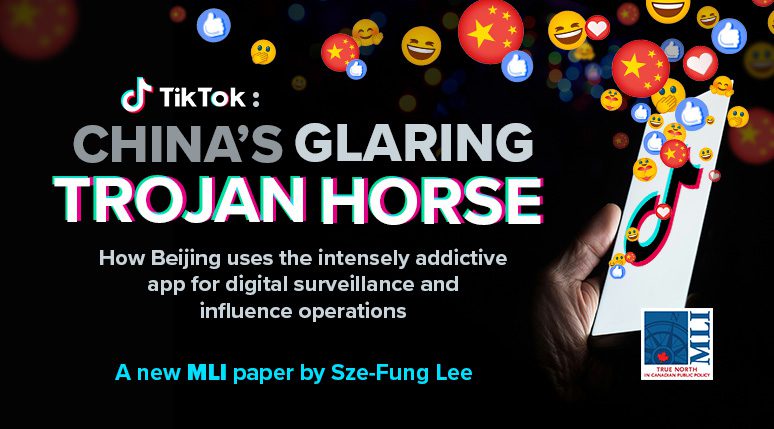By Sze-Fung Lee
May 14, 2024
Executive Summary
Amidst the controversies over the “TikTok ban” is the struggle between free speech and concerns about Beijing’s malign use of the platform’s data to threaten national security and liberal democracies. Yet little research has delved into the question from Beijing’s perspective – how does the People’s Republic of China (PRC) view TikTok? What is the significance of the platform, and how does it differ from other Chinese and Western social media platforms such as Weibo, WeChat, Meta, and X in terms of digital surveillance and influence operations?
This paper aims to unfold how and why TikTok serves as Beijing’s strategic tool to advance its political narratives and strategic agendas and the unique features of TikTok that enable it to fulfil that purpose. It explores how the PRC influence operations (IOs) are integrated with cognitive warfare tactics to manipulate the information environment on TikTok to coerce, sow confusion, magnify division, and conduct electoral interference in liberal democracies. Finally, the paper proposes policy recommendations to mitigate the threats posed by TikTok.
The first section focuses on Chinese leader Xi Jinping’s ambition for big data: how Beijing views and leverages TikTok for influence operations, and how data harvesting and mass surveillance fits into its grand strategy. It discusses TikTok’s speciality – producing and sharing short, influential, and addictive video content with billions of international users – and how this content facilitates biometric data harvesting and amplifies the effectiveness of Beijing’s digital surveillance and influence operations, bolstering the PRC’s goals in ways that other Chinese and Western social media platforms cannot. Closely tied to the Cyberspace Administration of China (CAC) – the PRC’s national internet regulator and censor – TikTok is a one-of-a-kind app that has become a Trojan Horse used by the PRC to gain invaluable access to and influence over Western democracies.
The second section concentrates on the data privacy issue: how data TikTok has collected differs from other Western “Very Large Online Platforms” (VLOPs), and how the PRC utilizes it for digital surveillance and transnational repression via initiatives such as “Project Raven,” which saw TikTok used to spy on Western journalists after they reported on the app’s repeated access of US user data. This section also discusses how TikTok’s data could be transferred to the PRC under China’s legal framework and through other unorthodox means such as backdoor codes and its in-app-linked video template software CapCut. Additionally, TikTok’s extensive global reach and pervasive data collection infrastructure imply that most of the PRC’s targets – journalists, activists, researchers, and China critics – could be subjected to Beijing’s mass surveillance, regardless of their geographic location and even if they are not using TikTok.
The third section investigates how Beijing leverages TikTok as a strategic tool to manipulate the information ecosystem while integrating cognitive warfare tactics that exploit vulnerabilities in human psychology for influence operations. Various case studies will be included to illustrate how the PRC and its affiliated entities utilize TikTok’s characteristics to maximize the impact of their influence operations. Recent IOs that amplified Beijing’s political narratives and strategic agendas include:
- disinformation campaigns during Taiwan’s presidential and legislative election;
- grey-zone activities around the Kinmen islands, located just off mainland China but controlled by Taiwan;
- conspiracy theories claiming that the US created the COVID-19 virus;
- and rebukes of “Western lies” about the PRC’s use of forced labour and the oppression of certain ethnic minorities within China, especially in the Xinjiang Uyghur Autonomous Region (XUAR).
I also explore the tactics, techniques, and procedures (TTPs) during IO events, as well their connection to the PRC and/or PRC-affiliated entities.
The paper will show how TikTok’s “For You” algorithm partially shares server codes with another of ByteDance’s apps, Douyin (the Chinese version of TikTok) – and explain how these algorithm codes are likely subjected to the PRC’s regulations on internet censorship and recommendation algorithms – manipulating what videos are visible and amplified for users.
The fourth section reveals some of the TikTok IOs that have targeted Canadians and discusses the implications for Canada if it fails to urgently act to protect the personal data of its citizens.
The final section proposes policy recommendations to mitigate the threat posed by TikTok and other China-based social media. For the US, this includes executing the recently passed Protecting Americans from Foreign Adversary Controlled Applications Act. In Canada, I argue for the enforcement of ByteDance’s divestiture from TikTok under the Investment Canada Act.
Given TikTok’s vast reach and influence, a key goal should be to compel it to divest from its Beijing-based parent company. Doing so would greatly help to protect our sensitive data from the PRC – especially since there are no other PRC-linked apps waiting in the wings to fill the gap of TikTok’s significance. Other longer-term solutions include:
- banning cross-border data transfer to foreign adversaries;
- scrutinizing laws and regulations for data brokers;
- mandating VLOPs to investigate and report on influence operations as universal transparency practices;
- and engaging in education campaigns and strategic communications initiatives that bolster democratic resilience.
It is imperative for like-minded democracies to take more rigorous measures to mitigate the risk posed by TikTok and ByteDance as soon as possible.
Read the full paper here:






